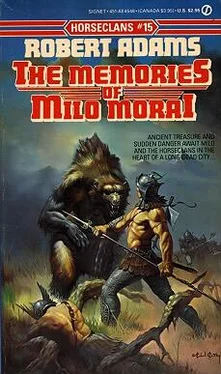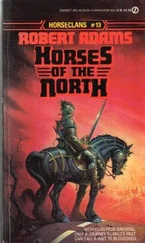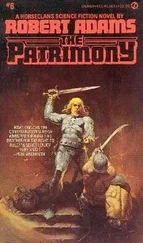The first stop was to speak with a one-legged boot-black, lead him over to the Rolls and let him look in at Milo. The next one was a gendarme, then there were assorted men and a few women, another gendarme, a score or more of taxi drivers and porters outside the main railway passenger terminal. Finally on their way to the main market, the chauffeur stopped only three times more—two women who looked to Milo like cheap streetwalkers and yet another gendarme.
Bidding M’sieu Moray to remain in the car, the chauffeur sped off afoot into the crowded, bustling open-air market. He was nowhere in sight when, by ones and twos and three, men and women and even children began to slowly dribble up to finally surround the Rolls, all of them staring in silence at Milo, whispering among themselves and pointing. Milo began to get a little edgy; he was carrying a fair sum of money now, in cash, and not a few of the crowd looked the part of hoodlums. He was a little relieved when a cassocked priest pushed through the crowd and walked up to the car, then tapped on the rolled-up window.
Once the glass no longer separated them, the priest asked, “Is M’sieu then truly the kind and generous sometime-capitaine Milo Moray, he who was so unbelievably kind to a poor man he never did meet and to that poor man’s desperate young daughter?”
“Father,” Milo asked his own question, “please, tell me, just what the devil is going on. From the moment I got into this car, the driver has been running it all over Paris and hopping out at odd times and places to drag people over to look at me as if I were some well-known dignitary or a two-headed calf.”
The priest did not smile, just nodded with solemnity. “You are most well known, m’sieu, but by name and charitable deeds only. Those who fought les Boches in Paris and her environs, those of the Resistance, we all have honored your name for more than three years, now. After the untimely demise of the brave Henri Gallion—he never, ever fully re-covered from the unmentionable things that the Gestapo did to him, and despite the warmth and food and comforts and medicines that your unparalleled generosity afforded his last few months of life, he died of pneumonia in July of 1945—his daughter, Nicole, and a prostitute named Angelique Laroux spreawd your fame far and wide within the circle of the Resistance. We tried many times to find you, and we did find your former battalion and company, only to discover that you had been seconded to another unit, but when we tried to find that unit, we always struck a blank wall, for some reason. Frankly, after all this time, we had despaired of ever finding you alive.
“Now, to suddenly find that you not only still live and are in Paris and even are married to a French-woman, the daughter of a most distinguished, deco-rated, retired French army officer, this all your chauffeur, Marcel Noyes, found so exciting that he could not but share with his fellow Resistance friends the rare honor of actually seeing you. I, too, am most honored, M’sieu Moray. I would be the more so could I shake your hand in the American fashion. I am Father Arsenne Mullineaux.” The hand extended through the window was a bit grubby, but his clasp was firm.
Upon seeing the handclasp, the people moved in closer, and a big, burly bear of a man pushed forward out of the crowd. As he came in closer, Milo thought that he looked a little like the common conception of a pirate, with his flapping eyepatch, his scar-laced face and his rolling gait. The husky man’s bearing marked him as a leader, and the priest instinctively moved a little to the side for him, thus confirming his status.
“It is really him, then, Father Arsenne?” he asked. “Marcel told the whole truth for a change, then, and we at last have found Milo Moray?” His voice matched his size, a basso growl.
Upon being assured that this gentleman in the back seat of the Rolls was the one, only and original Monsieur le Capitaine Milo Moray, he said shyly, “M’sieu, this sight of you is the God-sent answer to many a prayer. When you could not be found, after Germany capitulated, it was feared by many that les Boches had killed you and that you lay somewhere in an unmarked grave.
“I am Rene Febvre, called l’Petit. I have done many bad things in my forty years, but still I would shake the hand of a true saint, if he would permit me . . . ?”
At Milo’s acquiescence, the hand that came through the window was at least as large as that of a mountain gorilla and almost as hairy. There was the clear hint of enormous strength in the hand, but also of gentleness.
Before the car at last left the market area, Milo knew that he had shaken at least two hundred hands, and many of the shakers, the women in particular, had also kissed his hand. And when leave they did, the spacious interior of the Rolls was solidly packed with foodstuffs and wine, cognac and cordials. Nor had Milo been allowed to pay a single franc for any of it.
When he had begun to try to stuff bills into the pockets of those who were loading the best of their wares into the car, the hulking Rene Febvre had gently taken his arm and led him back toward the car, rumbling softly, “M’sieu Moray, please do not embarrass these men and women. You did so very much for a man and a girl who are heroes to us of the Resistance, your generous gift can never ever be repaid, but please let us try in our own small ways.”
They were only a short distance from their destination when Milo suddenly remembered his promise to Per, his adopted son. “Marcel, if there is anyplace left in this car to stow it, I promised to bring my children somebonbons, chocolats and pates d’amandes, perhaps. Could we stop at a shop that sells them?”
The chauffeur did not speak a word, just made a U-turn that sent piles of foodstuffs toppling through-out the car’s interior, came within bare centimeters of clipping a war-worn GI jeep with the unit markings painted over and a crate of guinea fowl in the back. The jeep driver took a hand off the wheel long enough to shake a clenched fist and shout spluttering curses. At the next turn, the Rolls came within millimeters of taking out a gendarme, but the chauffeur drove serenely on, seeming to not even hear the whistle shrilling angrily behind him.
Completely blocking a short, narrow street, Marcel double-parked before a tiny shop with the legend CONFISERIE painted on its front. Ignoring the bills in Milo’s outstretched hand—there being no way that Milo could have easily gotten out of the overstuffed car himself—the black-suited man got out of the vehicle and entered the shop, shortly emerging with a box that looked to hold at least two kilos and followed by an elderly woman and a younger man who both peered in at Milo for the length of time that it took Marcel to get going again.
Close to Etienne Duron’s house, Marcel stopped once more to engage two men in conversation, then proceeded the remainder of the distance much more slowly, with the two men standing on the running boards and clinging to the roof pillars while staring at Milo with looks of dumb adoration.
As the chauffeur and his two assistants began the job of unloading the well-loaded car into the kitchen and pantry of the house, Martine took Milo’s arm and protested,“Mon Dieu, husband, you bought far too much. My father has no refrigeration here, as we have in America, so most of this all will rot before it can be used. And what must have been the cost of all this, this . . . ?”
“Much less than one would think, my dear,” said Milo dryly, adding, “In point of pure fact, nothing, not a single franc.”
The woman just stared at him. “Milo, have you been drinking, perhaps?”
Marcel, who had overheard the exchange, chose that moment to say, “Madame does not know, then, M’sieu Moray?Of course not, she does not sound to have lived in France for some years, and m’sieu is clearly a man of surpassing modesty, as regards his charity.”
Читать дальше












